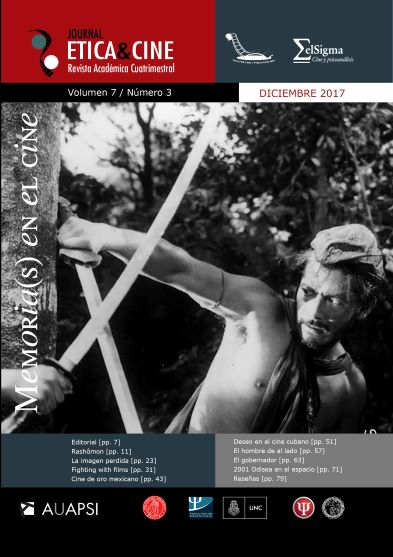Emerging film in Ecuador
DOI:
https://doi.org/10.31056/2250.5415.v7.n3.19626Keywords:
Emerging film, Ecuatorian cinema, Production, AudienceAbstract
The present work reflects on the emerging film in Ecuador, through a structural analysis of the national feature film “The Governer”, premiered in the year 2015 and produced for 10 days. This narrates the story of a political prisoner and his escape, dealing with common themes such as power and corruption. Likewise, an audience analysis is performed with the students from the Faculty of Communication, Arts and Humanity of the University Tecnológica Equinoccial, as practical Cinematography course work to deepen the meaning associated to the film from its emergent character. Emerging film arises as a solution to the limited production forms and low Budget cost, done in record time, with socially identifiable concepts directed to a local or regional audience. This cinema is rooted in the development of technical aspects and the opening of commercial roads.References
Burch, N. (1987). El Tragaluz del infinito: contribución a la geneaología del lenguaje cinematográfico. Madrid: Cátedra.
Carmona, J. (2015). Película El Gobernador. (Cinetel, Entrevistador)
Castro, C. (2015). Película El Gobernador. (F. Cine, Entrevistador)
Cineteca Nacional de México. (1974). México: Sistema del Banco Nacional Cinematográfico.
DLE. (2016). Diccionario de la Lengua Española. Recuperado el 28 de septiembre de 2016, de http://dle.rae.es
Echegaray, D. E. (1887). Diccionario General Etimológico de la Lengua Española. Madrid: José María Faquineto.
Jara, T. (Director). (2011). A tus espaldas [Motion Picture]. Ecuador.
King, J. (1994). El Carrete Mágico: Una historia del cine latinoamericano (Primera edición ed.). Colombia: Tercer Mundo Editores.
LFCN. (2006). Ley de Fomento del Cine Nacional. Quito: Registro Oficial 202, 3 de febrero de 2006.
MCyP. (n.d.). Ministerio de Cultura y Patrimonio. Retrieved 2016 ??? 13-octubre from http://picultural.culturaypatrimoni.
Morín, E. (2001). El cine o el hombre imaginario. Barcelona:Paidós.
Santos, Z. (2003). Pensar la imagen. Madrid: Cátedra.
Downloads
Published
Issue
Section
License
Los autores que publiquen en Ética y Cine Journal aceptan las siguientes condiciones:
Los autores/as conservan los derechos de autor © y permiten la publicación a Ética y Cine Journal, bajo licencia CC BY-SA / Reconocimiento - Reconocimiento-CompartirIgual 4.0 Internacional. La adopción de esta licencia permite copiar, redistribuir, comunicar públicamente la obra, reconociendo los créditos de la misma, y construir sobre el material publicado, debiendo otorgar el crédito apropiado a través de un enlace a la licencia e indicando si se realizaron cambios.

Este obra está bajo una licencia de Creative Commons Reconocimiento-CompartirIgual 4.0 Internacional.




